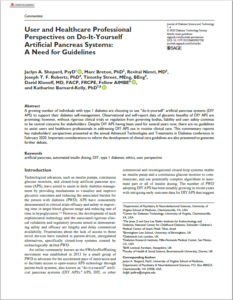A number of groups have a stake in DIY Artificial Pancreas Systems (APS) technology including users, healthcare providers, manufacturers, and clinicians. Given their diverse goals, needs, and professional commitments, these different groups have different perspectives on DIY APS use. A recently published paper by Dr Jaclyn Shepard and colleagues reports the views expressed by stakeholders during a meeting held at the Advanced Technologies and Treatments in Diabetes conference held in February 2020 in Madrid.
Dr Joseph Roberts attended the meeting and presented some of the Everyday Cybrog project’s research into DIY APS. In his contribution, he outlined a number of ethical considerations surrounding the use of these systems. The main points of he outlined were:
- There are a number of safety risks surrounding the use of DIY APS including device failure, inaccurate data, and security risks (including unauthorised third party access).
- Whether these risks are worth the benefits of DIY APS is something each user will have to decide for themselves based on their own values. There is no one size fits all in DIY APS.
- The use of DIY APS raises concerns about liability should harm occur.
- The lack of explicit guidance means that healthcare professionals (HCP) are unsure whether they should offer patients advice and support them in using DIY APS. If this precludes healthcare providers having discussions about DIY APS, this could be interpreted by patients as a lack of transparency which could undermine trust in the HCP-patient relationship.
Read the full paper on the publisher’s website here or by clicking on the image on the left.
Authors: Shepard, JA, Breton, M, Nimri, R, Roberts, JTF, Street, T, Klonoff, D, and Barnard-Kelly, K.

